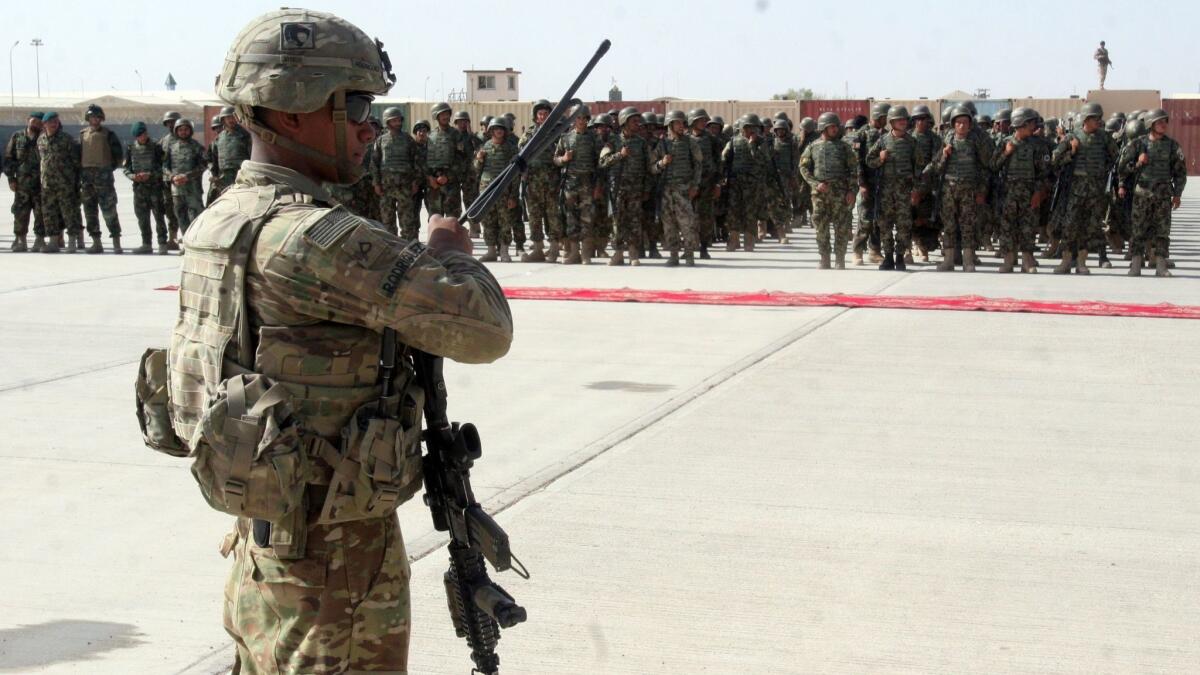How Trump will deal with America’s longest war is anyone’s guess

Reporting from KABUL, Afghanistan — Donald Trump has minced few words about his plans to build a wall on the U.S.-Mexico border and end the threat from Islamic State extremists.
But the president-elect has been virtually silent on his plans when it comes to Afghanistan, home to America’s longest war.
With 8,400 U.S. troops leading a 13,000-strong NATO mission in Afghanistan, the incoming administration inherits one of the United States’ most stubborn and complex foreign policy challenges. Although President Obama promised to end U.S. military involvement, American service members continue to be drawn into combat as Afghan security forces struggle to contain a resilient Taliban insurgency.
The U.S. military announced this month that 300 Marines would return in the spring to Helmand province, two years after leaving it in the hands of Afghan troops. The Taliban controls or is threatening to seize most of the 14 districts of Helmand, whose poppy fields are a key source of revenue for the insurgency.
Afghan officials grew accustomed to being near the top of Obama’s priority list in his first term, when he deployed more than 100,000 troops into the country. Then they became disillusioned when Obama withdrew forces and became more focused on battling Islamic State.
Under Trump — who has vowed to project American might while refraining from military adventures he views as “dumb” — U.S. policy in Afghanistan is anyone’s guess.
“Afghanistan has been used to being one of the top foreign policy issues for an American president,” said Omar Samad, a former Afghan ambassador to Canada and France. “There have been very few hints as to the mind-set of the incoming administration.”
Still, Samad said, Afghans are looking to the Trump administration for fresh thinking on ways to resolve a conflict now in its 16th year. In particular, officials hope the U.S. will step up its support for Afghan security forces and raise pressure on Pakistan, which they accuse of supporting the Taliban leadership.
Though the U.S. spent $3.6 billion on building Afghan security forces in 2015 alone, the Afghan army’s performance is at best inconsistent while the police have proved unable to keep control of areas cleared by the army.
The Afghan military is increasingly reliant on elite units and its nascent air force to bail conventional troops out of trouble, creating so much wear and tear on aircraft that the U.S. is considering spending an additional $800 million to replace the Afghan fleet.
Taliban militants continue to threaten major cities, although they are unable to hold urban centers for very long.
Yet even with no military victory in sight, efforts to open peace talks between the Taliban and the Kabul government have failed to gain momentum. A four-nation initiative involving China, Pakistan and the United States has faltered, while plans by Saudi Arabia to host talks have generated little excitement.
Some Afghans blame the Obama administration for failing to put more pressure on Pakistan. The U.S. continues to send Pakistan billions of dollars in military aid, although Congress registered its displeasure over Islamabad’s failure to rein in militant groups by withholding $300 million in funding last year.
Afghan officials who expected Trump to take a tougher line against Pakistan were not encouraged, however, when the president-elect offered effusive praise for Pakistani Prime Minister Nawaz Sharif, saying he was “a fantastic guy … doing amazing work.”
Trump’s sole phone call with Afghan President Ashraf Ghani was more circumspect. Asked about the conversation, a spokesman for Ghani, Zafar Hashimi, said, “Both sides agreed to continue dialogue and working in order to pursue mutual interests and eliminate mutual threats.”
Comments by some of Trump’s Cabinet picks have been welcomed in Kabul. At his confirmation hearing this month, retired Gen. James Mattis, a former commander of forces in Afghanistan who is Trump’s choice for Defense secretary, said he would “urge Pakistan to take further actions against the Taliban and the Haqqani network,” an allied militant group.
Trump’s incoming national security advisor, Lt. Gen. Michael Flynn, has signaled impatience with Pakistan, saying it is playing “a double game” by offering shelter to Taliban insurgents.
“People in top echelons of the incoming government have firsthand experience working on Afghanistan, but we’re not sure how that will translate to a new approach,” Samad said.
Analysts said Trump’s tough line against Islamic State, the Iraq- and Syria-based militant group whose supporters have established a foothold in eastern Afghanistan, indicated he would continue with Obama’s decision to expand the scope of the U.S. military’s mission there.
In recent months, after Obama gave U.S. commanders greater authority to support Afghan forces when they faced trouble, U.S. forces have escalated their use of airstrikes, launching 205 strikes in October, the most in a single month since 2014.
The lack of concrete policy statements puts Afghanistan in much the same position it faced when Obama was inaugurated in 2009: in a “forgotten war,” overshadowed by a military campaign in Iraq — this time to dislodge Islamic State.
Javid Faisal, a spokesman for Afghan Chief Executive Abdullah Abdullah, downplayed concerns and said the government was looking forward to working with Trump.
“We are more optimistic than pessimistic,” Faisal said.
Special correspondent Faizy reported from Kabul and Times staff writer Bengali from Mumbai, India.
Follow @SBengali on Twitter for more news from South Asia
ALSO:
When Trump says he wants to deport criminals, he means something starkly different than Obama
Yes, Trump can boost deportations and gut the Dreamer program for young immigrants
An outsider takes charge of the Border Patrol — and yes, he’ll wear the green uniform
More to Read
Sign up for Essential California
The most important California stories and recommendations in your inbox every morning.
You may occasionally receive promotional content from the Los Angeles Times.











